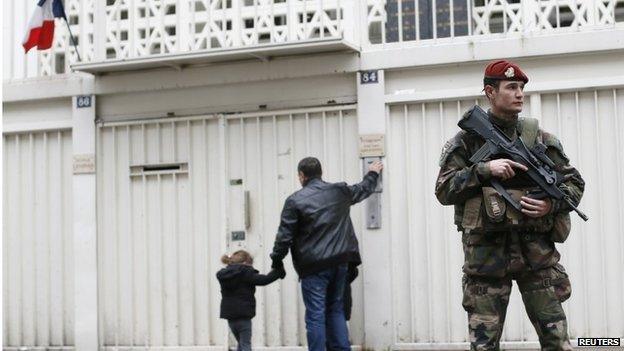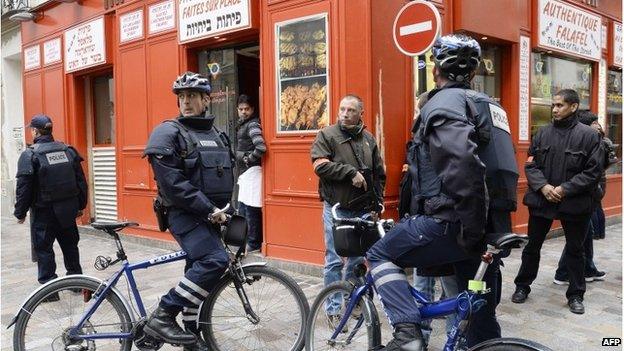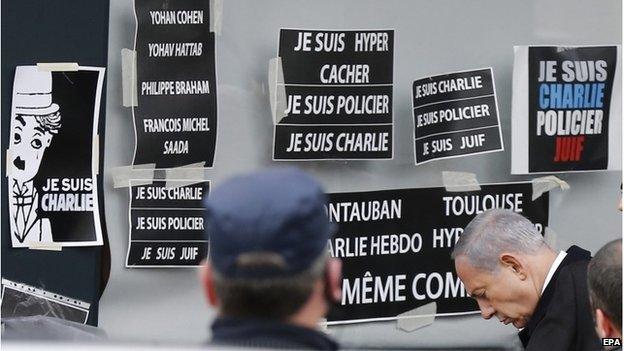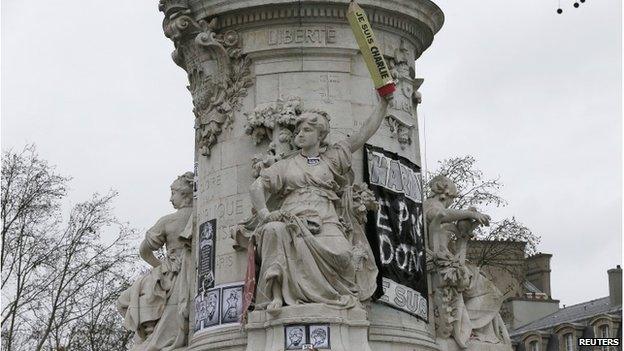Paris attacks: France to deploy 10,000 troops
- Published

Troops were being deployed outside Jewish schools and synagogues
France is mobilising 10,000 troops to boost security after last week's deadly attacks, and will send thousands of police to protect Jewish schools.
Defence Minister Jean-Yves Le Drian said troops would be in place from Tuesday evening in sensitive areas.
It is the first time troops have been deployed within France on such a scale.
Seventeen people were killed in Paris last week in attacks at satirical magazine Charlie Hebdo, on a police officer, and at a kosher supermarket.
On Sunday, an estimated 3.7 million people took to the streets to show solidarity with the victims, including 1.5 million people in Paris.
About 40 world leaders joined the start of the Paris march, linking arms in an act of solidarity.
President Francois Hollande ordered the deployment of troops during a crisis meeting with top officials early on Monday.
French defence minister: "The mobilisation started this morning"
The supermarket attacker's partner was caught on CCTV at an Istanbul airport days before the January 2015 attacks
Mr Le Drian said the deployment, the first of its kind, was needed because "threats remain present".
Interior Minister Bernard Cazaneuve announced that nearly 5,000 members of the security forces would be sent to protect France's 717 Jewish schools, and that troops would be sent as reinforcements over the next two days.
Prime Minister Manuel Valls said synagogues would also be protected, as would mosques, following some retaliatory attacks over the Charlie Hebdo killings.
Last week, Mr Valls admitted there had been "clear failings" after it emerged that the three gunman involved in the attacks - Said and Cherif Kouachi and Amedy Coulibaly - had a history of extremism.
Chris Bockman said security was tight at a Jewish school in Toulouse which was the scene of a fatal attack in 2012
The Kouachi brothers were on UK and US terror watch lists and Coulibaly had previously been convicted for plotting to free a known militant from prison. Coulibaly met Cherif Kouachi while in jail.
Coulibaly and the two brothers were shot dead on Friday after police ended two separate sieges.
Coulibaly killed four people at a kosher supermarket in eastern Paris on Friday before police stormed the building. He is also believed to have shot dead a policewoman the day before.

Armed police patrolled on Monday in the Marais, a historic Jewish neighbourhood in central Paris

Israeli leader Benjamin Netanyahu, who came to Paris for Sunday's march, visited the kosher supermarket

After the huge marches, a statue in Place de la Republique was left holding a giant "I am Charlie" pencil
Ahead of Sunday's rally in Paris, a video emerged appearing to show Coulibaly pledging allegiance to the Islamic State militant group.
In the video, he said he was working with the Kouachi brothers: "We have split our team into two... to increase the impact of our actions."
The Kouachi brothers claimed they were acting on behalf of Yemeni branch of al-Qaeda (AQAP). But experts say it is highly unlikely that Islamic State and al-Qaeda, rivals in the Middle East, would plan an attack together.
BBC News takes a look at the most memorable moments of a unity march that saw 1.6 million people take to the streets of Paris
The attacks in Paris started last Wednesday, when the Kouachi brothers raided the offices of the satirical magazine Charlie Hebdo, killing 12 people - including eight journalists and two police officers.
Mr Valls said on Monday that authorities thought that the attackers had at least one accomplice, for whom police are still hunting.
One suspect is Hayat Boumeddiene, Coulibaly's partner, though she left France before the attacks. The Turkish foreign minister said she had arrived in Turkey on 2 January from Madrid, before continuing to Syria six days later.
Surveillance footage released on Monday showed Hayat Boumeddiene entering Turkey at an Istanbul airport, accompanied by a man.
Turkish officials told the BBC the man was Mehdi Sabri Belhouchine, a man of "North African origin", and that he was not on a watch list. Officials believe he crossed into Syria with Hayat Boumeddiene.
Mr Valls also said that a jogger shot in a separate attack in Paris on Wednesday, which prosecutors have linked to Coulibaly, was "between life and death".
In London, Prime Minister David Cameron consulted senior intelligence and security officials on Monday over Britain's response to the attacks in France.

How the attacks unfolded (all times GMT)

Wednesday 7 January 10:30 - Two masked gunmen enter Charlie Hebdo offices, killing 11 people, including the magazine's editor. Shortly after the attack, the gunmen kill a police officer nearby.
11:00 - Police lose track of the men after they abandon their getaway car and hijack another vehicle. They are later identified as brothers Said and Cherif Kouachi.
Thursday 8 January 08:45 -A lone gunman shoots dead a policewoman and injures a man in the south of Paris. Gunman later identified as Amedy Coulibaly.
10:30 - The Kouachi brothers rob a service station near Villers-Cotterets, in the Aisne region, but disappear again.
Friday 9 January 08:30 - Police exchange gunfire with the Kouachi brothers during a car chase on the National 2 highway northeast of Paris.
10:00 - Police surround the brothers at an industrial building in at Dammartin-en-Goele, 35km (22 miles) from Paris.
12:15 - Coulibaly reappears and takes several people hostage at a kosher supermarket in eastern Paris. Heavily-armed police arrive and surround the store.
16:00 - Kouachi brothers come out of the warehouse, firing at police. They are both shot dead.
16:15 - Police storm the kosher supermarket in Paris, killing Coulibaly and rescuing 15 hostages. The bodies of four hostages are recovered.